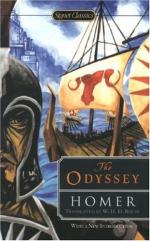“When we reached the harbour we found it land-locked under steep cliffs, with a narrow entrance between two headlands. My captains took all their ships inside, and made them fast close to one another, for there was never so much as a breath of wind inside, but it was always dead calm. I kept my own ship outside, and moored it to a rock at the very end of the point; then I climbed a high rock to reconnoitre, but could see no sign neither of man nor cattle, only some smoke rising from the ground. So I sent two of my company with an attendant to find out what sort of people the inhabitants were.
“The men when they got on shore followed a level road by which the people draw their firewood from the mountains into the town, till presently they met a young woman who had come outside to fetch water, and who was daughter to a Laestrygonian named Antiphates. She was going to the fountain Artacia from which the people bring in their water, and when my men had come close up to her, they asked her who the king of that country might be, and over what kind of people he ruled; so she directed them to her father’s house, but when they got there they found his wife to be a giantess as huge as a mountain, and they were horrified at the sight of her.
“She at once called her husband Antiphates from the place of assembly, and forthwith he set about killing my men. He snatched up one of them, and began to make his dinner off him then and there, whereon the other two ran back to the ships as fast as ever they could. But Antiphates raised a hue-and-cry after them, and thousands of sturdy Laestrygonians sprang up from every quarter—ogres, not men. They threw vast rocks at us from the cliffs as though they had been mere stones, and I heard the horrid sound of the ships crunching up against one another, and the death cries of my men, as the Laestrygonians speared them like fishes and took them home to eat them. While they were thus killing my men within the harbour I drew my sword, cut the cable of my own ship, and told my men to row with all their might if they too would not fare like the rest; so they laid out for their lives, and we were thankful enough when we got into open water out of reach of the rocks they hurled at us. As for the others there was not one of them left.
“Thence we sailed sadly on, glad to have escaped death, though we had lost our comrades, and came to the Aeaean island, where Circe lives—a great and cunning goddess who is own sister to the magician Aeetes—for they are both children of the sun by Perse, who is daughter to Oceanus. We brought our ship into a safe harbour without a word, for some god guided us thither, and having landed we lay there for two days and two nights, worn out in body and mind. When the morning of the third day came I took my spear and my sword, and went away from the ship to reconnoitre, and see if I could discover signs of human handiwork, or hear the sound of voices. Climbing to the top of a high look-out I espied the smoke of Circe’s house rising upwards amid a dense forest of trees, and when I saw this I doubted whether, having seen the smoke, I would not go on at once and find out more, but in the end I deemed it best to go back to the ship, give the men their dinners, and send some of them instead of going myself.




